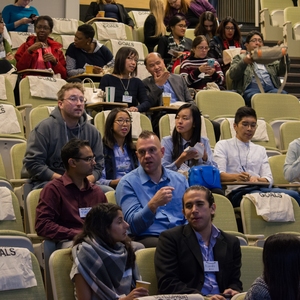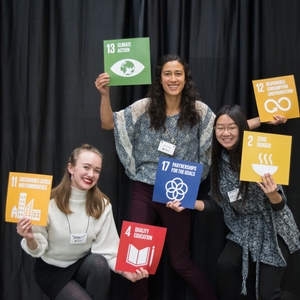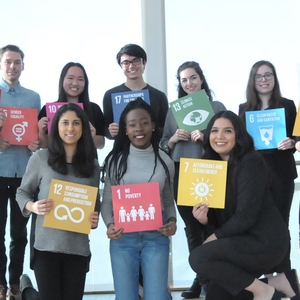Leveraging student leadership to build campus capacity for Sustainable Development Goals implementation: a case study on the University of Calgary’s Sustainable Development Goals Alliance.
University of Calgary
Project Overview
The Sustainable Development Goals Alliance (SDGA) is a student-led organization at the University of Calgary which seeks to improve campus and community collaboration towards the implementation of the seventeen Sustainable Development Goals (SDGs). Through a unique partnership with the University of Calgary’s Office of Sustainability, and supporting partners across multiple institutional offices, the SDGA has built an interdisciplinary network of students, staff, and community leaders in sustainability. These connections are leveraged to amplify youth-led initiatives, promote multidisciplinary collaboration, and support student leadership in sustainability through funding, networking, and engagement opportunities across campus.
Background
In 2017, and guided by the 2030 Agenda for Sustainable Development and the Government of Canada’s commitment to supporting the SDGs, a motivated group of undergraduates, graduates, and staff at the University of Calgary began to assemble an innovative framework to engage students across a diverse range of experiences and interests with the SDGs. The SDGA was borne out of numerous student and staff consultations that recognized 1) the redundancies among sustainability-related student clubs and engagement opportunities on campus, 2) the value of interdisciplinary collaboration between clubs, student organizations, and institutional bodies, and 3) the potential for a campus-wide, student-led network to unite, focus, and amplify sustainability initiatives at the University of Calgary. Prior to September 2017, the three major groups advancing progress towards the SDGs were the student-run Humanitarian Alliance (HA), the institution-run Sustainability Clubs Alliance (SCA), and the student-run SDG Training Committee. These three groups functioned to support the large network of student clubs on-campus whose work aligns with the SDGs. However, the similar focuses and priorities of these organizations led to competition for students’ attention. Since both the HA and SCA were comprised of student clubs, there was frequent overlap in club membership amongst both alliances, leading to challenges in student engagement as these two groups provided similar and often competing opportunities. In September 2017, an initial exploration of a merger involving these three stakeholders was pursued and in September 2018, a finalized form of the SDGA was created which amalgamated the HA, SCA, and the SDG Training Committee. During this time, the founding team worked closely with staff advisors at the Office of Sustainability (OS) to refine initiatives previously organized by the HA, SCA, and SDG Training Committee, and to develop a program plan, best practices and Terms of Reference. As of 2019, the SDGA is now the only alliance on campus that serves to represent clubs and student organizations that are actively pursuing work related to the seventeen SDGs. The SDGA continues to maintain a strong working partnership with the OS, which provides administrative, financial, and logistical support for Alliance initiatives.
Goals
The SDGA model operates around three pillars: 1) Student engagement, 2) Advocacy, and 3) Community Training. The SDGA’s goals for student engagement surround the continued recruitment of clubs to join the SDGA and for strengthened support amongst students to rally behind the SDGs. Currently, club membership within the SDGA sits at 20 clubs, with a goal of representing 50 clubs within the next academic year. Rallying student support behind the SDGs will be achieved through innovative programming that provides funding, event planning, and networking resources for students, while also showcasing the knowledge of students who are already advancing the SDGs on campus. By encouraging peer-to-peer knowledge transfer, a secondary goal is to promote student collaboration on future sustainability initiatives to better amplify their impact. The SDGA’s goals for advocacy include the eventual elimination of single-use plastic from all vendors and merchants at the University of Calgary through the use of petitions, letter writing, and peaceful protest. In addition, the SDGA seeks to strengthen the campus voice on sustainable development, by providing students with opportunities to share their concerns, priorities, and ideas through surveys and focus groups. The SDGA’s goals for community training are to increase campus knowledge of local and global issues in sustainable development, and to build capacity for student leadership and activism. These targets are primarily achieved through the yearly SDG Summit, a large-scale conference and professional development day for students to connect with community leaders and professionals in sustainable development through presentations, workshops, and interactive programming. The skills taught through the SDG Summit provide students and community members with important insights into the ways in which the SDGs can be acted upon in both local and global contexts.
**Pillar #1 – Student Engagement ** 1. Represent at a minimum of 20 clubs, with future targets of 50 within the next year 2. Encourage peer-to-peer knowledge transfer by supporting student-led collaborative events (social events, workshops, speaker series, panel discussions) 3. Provide funding, event planning resources, and networking opportunities to support student-led initiatives for member clubs within the SDGA
Pillar #2 – Advocacy 1. Eliminate single use plastic on-campus through petitions, letter writing, and peaceful protests 2. Map student perspectives and priorities related to the SDGs using data collection tools such as surveys and focus groups
Pillar #3 – Community Training 1. Continue the yearly execution of the SDG Summit with training programming designed to provide the tools and resources necessary for students and community members to take action towards the SDGs 2. Provide regular workshops on a monthly basis to connect SDGA members with resources relevant to the various SDGs.
Implementation
This project began its implementation in September 2017 and is ongoing with continual monitoring and evaluation to identify new ways that the SDGA can impact the student experience. The project implementation initially involved student representatives from the Humanitarian Alliance, Sustainability Clubs Alliance, SDG Training Committee, and other clubs on campus, but has since expanded to include other student leaders in the University of Calgary Community and staff representatives from the Office of Sustainability. The project was implemented according to the timeline attached below.
Timeline
September 2017 • Initial meetings with the SDG Training Committee, SCA, and HA representatives • Identification of the Alliance’s role on-campus and in the community • SDG Training Committee hosts the successful SDG Training Day (SDG Summit)
**October 2017 ** • Hosted roundtable meeting with member clubs in the SCA and HA • Began collecting input from students on the drafted constitution for the SDGA
**November 2017 ** • Hosted a second roundtable meeting with member clubs in the SCA and HA
**January 2018 ** • Applied for Students’ Union (SU) club status, but was rejected on the grounds that ‘alliances’ could not be considered individual clubs
February 2018 • Hosted and planned programming for the University of Calgary’s International Development Week
**March 2018 ** • Began talks with the University of Calgary’s Office of Sustainability (OS) to identify a possible collaboration with the SDG Summit and the SDGA’s general operations
April 2018 • Continued talks with the OS and planning for the SDG Summit
**May 2018 – August 2018 ** • Planning the SDG Summit • Approval of a budget for the SDGA’s operational expenses for Academic Year 2018-2019 from the OS
**September 2018 ** • Execution of the second annual SDG Summit
**October 2018 ** • SDGA participation in the institutional Sustainability Week • Club recruitment to the Alliance during Sustainability Week • Introduction of the SDGA Forum (an online group where members can post SDG-related opportunities and advertise events) • Workshop hosted in partnership with a local non-profit on green architecture
**November 2018 ** • Clubs roundtable discussion about the SDGA and resources for students
January 2019 • First club collaboration with a student club, financed by the SDGA • Workshop hosted by U of C professor and community leader on health inequities among immigrants
**February 2019 ** • International Development Week event focused on storytelling and showcasing student experiences with international development
April 2019 • Approval of a program plan and budget for the SDGA’s operational expenses for Academic Year 2019-2020 from the OS • Planning in progress for the third annual SDG Summit
Financing
The majority of funding obtained by the SDGA is used to finance the SDG Summit, a day-long conference that engages between 100-200 students annually and costs roughly $10 000 each year to organize. Since tickets to this event are free of charge to increase its accessibility, these funds are used to cover the costs of venue, catering, audio/visual expenses, marketing and promotional materials, swag bags for attendees, event materials, and speaker gifts/honorariums. Funding for this event has historically been secured through community grants and generous contributions from the SDGA’s partnerships with the Office of Sustainability and Mama na Mtoto, an East Africa research initiative at the Cumming School of Medicine.
Our operating costs for the 2018-19 academic year (September – April), excluding the SDG Summit, totaled around $3000. These funds were used to cover costs including event materials and catering for workshops and panels hosted by the SDGA, sustainable cutlery offered free of charge to SDGA member clubs, speaker gifts/honorariums, monetary grants for student events, and marketing and promotion. These funds were drawn primarily from the SDGA operating budget allocated by the Office of Sustainability. Additional funding was obtained through successful grant applications to the Next Generation – Collaboration for Development program ($1000) and TakingITGlobal ($750).
Results
Since its inception in late 2017, the SDGA has made significant progress in furthering campus engagement in sustainable development and building capacity for student leadership and collaboration at the University of Calgary. In the past year, the SDGA has engaged over 300 students, 40 university staff, and 30 community members in its initiatives, as well as established and/or broadened its working relationships with institutional partners including the Office of Sustainability, Cumming School of Medicine, and UCalgary International. As of May 2019, there are 23 student clubs who hold membership within the SDGA. Specific outcomes of this project are as follows:
1. Hosted 2 SDG Summits, day-long conferences with opportunities for learning and networking in the context of the SDGs a. These conferences have engaged over 250 students and community members through workshops and discussions on topics such as anti-racism, food security, wastewater management, CO2 emissions, anti-corruption, and gender-based analysis.
2. Hosted 3 interactive workshops on topics including gender equity (in partnership with Plan Canada), immigrant health inequities (in partnership with a clinician-scientist at the University of Calgary), and green architecture (in partnership with the Canada Green Building Council) a. These events have served as opportunities for students to learn about important local and global issues in sustainable development, network with community leaders, and reflect critically on their contributions to and ability to engage with sustainability.
3. Established the SDGA Members’ Grant, a $500 funding pool designing to support innovative student initiatives aligned with one or more of the SDGs a. This year, the Members’ Grant was awarded to a student group organizing a charity fashion show exploring gender diversity and LGBTQ+ representation in the fashion industry.
4. Hosted a panel and student showcase for International Development Week 2019 a. This event featured speakers working in diverse areas such as maternal and child health, gender equity, clean water and sanitation, and economic development. The discussions occurring during the event helped increase student knowledge of the realities of international development and highlighted the importance of global citizenship, collaboration, and youth engagement in making change. b. This event additionally showcased the experiences, knowledge, and perspectives of University of Calgary students who have travelled abroad to conduct research, volunteer, work, or study.
**5. Partnered with a student organization to support a panel event on the local opioid crisis ** a. The SDGA provided logistical, promotional, and financial support to showcase the work of a student club at the University of Calgary. b. This event explored the realities and misconceptions of drug use, and sparked an in-depth discussion on a compassion-based, harm-reduction approach to addressing drug addiction.
6. Created a common platform for individuals interested in sustainable development to share local and international opportunities related to SDG implementation a. The SDGA Forum is a Facebook group open to the public, where members are able to share opportunities, recruit volunteers, and promote events. b. Between July 1, 2018 and March 30, 2019, there were 435 members (306 active) and 186 opportunities posted.
Lessons Learned
One key takeaway we learned through this project was the importance of obtaining input from a wide variety of stakeholders. During our project’s implementation, our team realized that we represented the opinions, perspectives, and values of only a small subset of the greater campus community. Thus, we engaged with student leaders, institutional staff, community members, and the greater student body in order to hear their priorities and perspectives on sustainability. This allowed us to develop targeted, meaningful and impactful initiatives that were accessible to a broad population. In doing so, we were also able to recognize the multitude of student-led initiatives furthering sustainability at the University of Calgary, and the value of cross-campus collaboration in strengthening and growing these initiatives.
In addition, we also realized the value of continuous project monitoring and evaluation as a means of improving and building upon past events and successes. Following our major events (such as the SDG Summit and International Development Week events), our team has worked to generate event reports containing event highlights, engagement metrics, and areas of improvement. In addition, feedback collected during mid- and post-event surveys allows us to identify the highs and lows of our initiatives from the perspective of a participant or attendee. By consistently reflecting on the organization, execution, and overall impact of our initiatives using a critical lens, we have been able to pinpoint aspects of our events that were successful, while also recognizing areas for us to improve on. These key learnings and best practices have been documented for our current team and future students to reference. The flexibility and openness of our team to acknowledge our shortcomings and pilot new projects and initiatives has also allowed us to grow and mature as an organization.
Finally, we also found the institutional support of the Office of Sustainability to be an incredibly valuable support for our organization, by allowing us to better promote our initiatives, access a wider network and audience, secure project funding, and maximize our impact within the structure of a university. In particular, working with the Office of Sustainability has allowed us to form new connections with students, staff, and the greater community, as well as learn about current sustainability initiatives at the University and how the SDGA fits within them.



